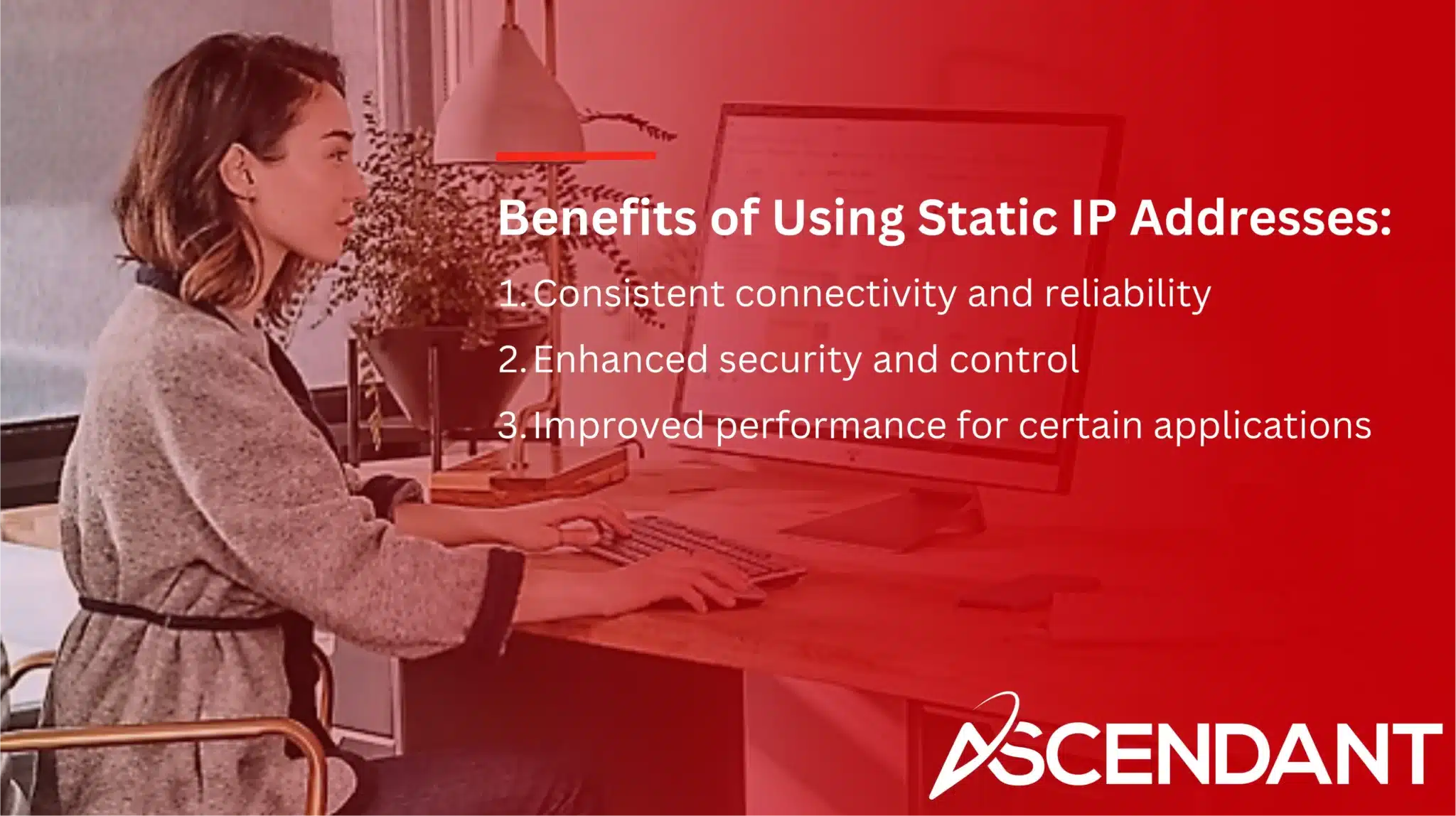A static IP address is a permanent, unchanging address assigned to a device on a network. Unlike dynamic IP addresses that change periodically, static IP addresses remain consistent. This reliability makes them ideal for services needing stable connections, like web servers and VPNs. In this article, we’ll explore what is a static IP, how it works, its benefits, and how to set one up.
Key Takeaways
- Static IP addresses provide a permanent identifier for devices on a network, essential for services requiring consistent connectivity and reliability.
- They offer enhanced security features, enabling better control over network traffic and are particularly beneficial for applications like VoIP and VPNs.
- Requesting and configuring a static IP address involves working with an Internet Service Provider and requires manual setup to ensure proper network connectivity.
Understanding Static IP Addresses
Grasping the importance of static IP addresses requires a basic understanding of what an IP address is and its role in networking. An IP address stands for “Internet Protocol address,” which is a distinctive number designated to each device connected to a network, facilitating their interaction and communication effectively. Among the prevalent forms are IPv4 and IPv6. Both accomplish similar functions but differ structurally.
Just like physical street addresses ensure that postal mail reaches your doorstep, IP addresses enable devices to find each other on the internet. Delving into details about static IPs sheds light on these matters by underscoring that an ip address serves as a unique identifier for individual devices within the digital landscape.
What is a static IP address?
A static IP address maintains its consistency until the associated device is retired or there’s a modification in the network architecture. Static IPs contrast with dynamic IP addresses that are known to change at various intervals, ensuring a persistent and reliable identifier throughout single or numerous network sessions.
Due to their stability, static ip addresses are particularly well-suited for critical infrastructure demanding stable connectivity, like servers, or apparatuses needing regular recognition. Companies frequently utilize static ips to ensure dependable services such as server hosting and enhancing online visibility.
How does a static IP address work?
Internet Protocol (IP) addresses, when designated as static IPs by Internet Service Providers (ISPs), retain their assigned values without alteration until the associated device is decommissioned or there is a modification within the network architecture. These fixed identifiers may follow either IPv4 or IPv6 standards, although it’s more common to see static IP assignments using the prevalent IPv4 scheme.
The use of static IP addresses streamlines Domain Name System (DNS) setups due to their unchanging nature, which facilitates smoother domain name resolution processes. This steady and unchanged addressing proves highly advantageous for applications that depend on regular address identification like website hosting services or systems that enable remote access functionality.
Benefits of Using Static IP Addresses
Static IP addresses deliver not only a reliable connection, but also ensure a consistent identity on the network, bolster security measures, and boost performance for certain applications.
We’ll delve into these advantages more thoroughly.
Consistent connectivity and reliability
Static IP addresses provide a consistent and reliable connection, essential for services that demand continuous accessibility. On the other hand, dynamic IPs regularly cycle their assigned address, posing potential disruptions and DNS complications unsuitable for services exposed to the internet.
By maintaining an unbroken link to online resources, static IPs deliver reliability vital for numerous web-based applications. This stability benefits businesses and individual users alike by ensuring seamless operation of critical functions.
Enhanced security and control
By utilizing static IP addresses, network security is bolstered through the facilitation of IP allowlisting, which limits access exclusively to recognized devices. The ability to regulate network traffic in this manner enhances the efficacy of filtering authentic connections and diminishes the likelihood of illicit entry.
Employing static IPs permits companies to enforce more rigorous security protocols, thereby elevating the protection of their entire network infrastructure.
Improved performance for certain applications
Applications such as VoIP and VPNs, which require stable and reliable connections, gain advantages from the use of static IPs. These services become more robust for business applications by improving the reliability of VPNs.
Static IPs contribute to improved performance in voice and video communications by enabling faster downloads and uploads. This is particularly beneficial for users who handle large amounts of data, ensuring they experience enhanced efficiency.
Setting Up a Static IP Address
To configure a static IP address, you must first obtain one from your Internet Service Provider (ISP). Following that, set up the devices to use the static IP and resolve any potential problems encountered during setup.
Requesting a static IP from your ISP
Reach out to your Internet Service Provider (ISP) to request a static IP address. You will likely have to complete specific paperwork, and there may be extra charges involved. When you make contact with your ISP, ask for a static IP, and they will assist you with the necessary steps.
Configuring devices with a static IP
Once you have your static IP, go into the network settings of either your router or individual devices and input the information given to you by your ISP. This will include not only the assigned static IP, but also the subnet mask, default gateway, and DNS server address.
Despite being a bit cumbersome, manual configuration is essential for making sure that your devices are utilizing the static IP as intended.
Troubleshooting common setup issues
Should difficulties occur during the configuration of a static IP, it is advisable to look for typical issues such as incorrect setup parameters or problems with network connection. Verify that each device’s network settings accurately include the proper IP address, subnet mask, gateway, and DNS information.
Consulting troubleshooting manuals from your Internet Service Provider may offer assistance in rectifying any complications encountered throughout the static IP arrangement.
Comparing Static and Dynamic IP Addresses
Grasping the distinct differences between static and dynamic IP addresses is essential, as both fulfill similar fundamental roles yet exhibit unique traits and applications. Comprehending these variations enables you to discern which kind of IP address—static or dynamic—is more appropriate for your specific requirements.
Static IP vs. dynamic IP: Key differences
Static IPs are consistent and unchanged, facilitating better name resolution and offering more stability. They come at a higher cost compared to dynamic IPs which change regularly, typically leading to reduced maintenance expenses and being more economically efficient overall.
When to choose a static IP address
For businesses operating websites and internet services, particularly when it involves hosting a web server or providing secure remote access through an internet connection, static IP addresses are crucial.
Having a static IP enhances the reliability of business hosting solutions, guaranteeing that remote workers who utilize VPNs can consistently access the necessary resources.
When to opt for a dynamic IP address
For general consumer use and home networks, dynamic IP addresses are often the optimal selection due to their cost efficiency and minimal management requirements. Dynamic is dynamic. IPs meet the usual internet needs of consumers effectively, rendering a dynamic address an advantageous choice in such circumstances, particularly when factoring in the suitability of dynamic ips.
Security Considerations for Static IP Addresses
Understanding the security risks associated with static IP addresses is crucial, despite their numerous advantages. By implementing suitable precautions, you can safeguard your network effectively.
Potential security risks
Static IP addresses can be more vulnerable to unauthorized network access due to their increased risk of hijacking. Attackers may also use the geographical information that static IPs disclose for orchestrated attacks.
By recognizing and comprehending these security vulnerabilities, steps can be taken to reduce the dangers linked with the use of static IP addresses.
Protecting your static IP address
Securing your static IP address is essential to safeguard against unauthorized access and cyber threats. Utilizing firewalls creates an additional security barrier by overseeing network traffic and halting any malevolent activities.
For enhanced protection of your static IP, employing a VPN will encrypt your online data flow while concealing your actual IP from would-be aggressors. The implementation of robust passwords on devices within the network is vital in thwarting unwarranted entry and assaults aimed at compromising your static IP.
Real-World Applications of Static IP Addresses
Practical implementations of static IP addresses include their use for hosting servers and websites, enabling remote access to systems, and overseeing Internet of Things (IoT) devices.
To delve into these applications in the real world:
Hosting websites and servers
Hosting websites and servers necessitates the use of static IP addresses, which offer a stable address that ensures dependable access. Static IPs are vital in maintaining seamless service and minimizing latency for individuals visiting the website.
For businesses that rely on a steady online presence, this reliability is critical to ensure consistent accessibility.
Remote access and telecommuting
Employees can securely and dependably link to workplace networks from distant places through static IPs, ensuring steady access to company resources.
The stable and secure connection provided by static IPs is especially advantageous for remote work, increasing the adaptability of employees.
IoT and smart devices
Static IPs are crucial for the consistent network addressing required to manage IoT devices effectively, ensuring stable communication and simplifying device management within smart home systems. Since dynamic IP addressing can cause connectivity problems, many IoT devices depend on static IPs for reliable communication.
Summary
Grasping the advantages of using static IP addresses can greatly enhance your internet footprint and network dependability. Static IPs ensure continuous connection, heightened security, and superior performance for certain types of applications. If you are managing a web server, enabling remote access or overseeing IoT devices, static IP addresses provide the steadfastness and consistency crucial for such operations.
To sum up, despite the extra expenses and initial configuration efforts associated with static IP addresses, their merits frequently eclipse these minor inconveniences—particularly for enterprises and essential services. Adopting static IPs paves the way to a digital setting that’s both more reliable and secure.
 Frequently Asked Questions
Frequently Asked Questions
What is the main difference between static and dynamic IP addresses?
The main difference between static and dynamic IP addresses is that static IPs remain constant, providing stability for services requiring consistent access, while dynamic IPs can change frequently, making them more cost-effective for general consumer use.
When should I choose a static IP address?
A static IP address is ideal when you need a stable connection for services like hosting servers, secure remote access, or specialized network configurations.
This is particularly beneficial for businesses with websites or internet services.
Are there any security risks associated with static IP addresses?
Yes, static IP addresses can pose security risks, including increased susceptibility to hijacking and targeted attacks.
To mitigate these risks, it is crucial to use firewalls, VPNs, and strong passwords.
How do I request a static IP address from my ISP?
If you need a static IP address, reach out to your internet service provider (ISP) and ask about the procedure for obtaining one. Make sure to complete any required paperwork and talk about possible charges that may apply.
What are some real-world applications of static IP addresses?
For the purposes of hosting websites and servers, ensuring reliable remote access, and efficiently managing IoT devices, static IP addresses play a pivotal role. They provide uninterrupted connectivity, which is crucial for maintaining seamless functionality in such practical applications.


